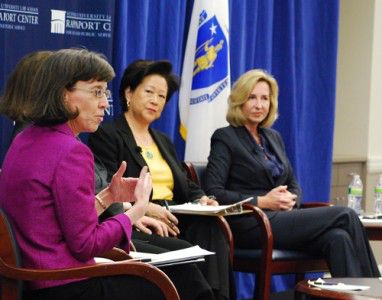
A bipartisan panel discussed the underrepresentation of women in Massachusetts state politics and how the number of female politicians could be increased at Suffolk Law’s Rapport Center on Wednesday.
More than 100 Bostonians attended the all-female panel, which included three politicians, as they gave personal insight into how women are treated in politics.
Leanne Doherty, a professor of political science at Simmons College, said that the underrepresentation of women in Bay State politics isn’t because female candidates don’t win the races they enter.
“Women win as successfully as their male counterparts when they run,” Doherty said. “It is not that women are being defeated in record numbers. It’s that women aren’t running in the first place.”
“It was a long decision making process for me, most of which was me swearing I would never run for office,” said Rep. Martha Walz. “I finally got the point later in my years where I had the personal courage to do it and risk losing in public.”
Former Lieutenant Gov. Kerry Healey had a similar story of running for political office later in life.
“I thought for a long time my place would be much more in academia,” Healey said.
After getting her doctorate and working as a researcher, Healey had a realization that pushed her to running for office.
“I realized that if I really wanted to get these things done that I care about I was going to have to put myself out there,” she said.
The age at which most female politicians run for their first public office has long term effects for the number of women in the highest government positions, Doherty said.
“If you don’t start till you’re 50, it’s a little hard to end up in the U.S. Senate,” Walz said.
The panel said that they felt they were treated fairly by the media during their campaigns, but they felt that both the media and the public punish female candidates that are either too emotional or too reserved.
“I think that all female politicians are very aware of the very narrow emotional band of which we can occupy without risking some kind of comment or criticism,” Healey said.
Doherty made a point to distinguish the difference between mainstream media and social media when discussing bias toward female candidates.
Doherty said that because of the growth of social media many female candidates have to face comments that they would not formerly have had to face.
Walz was able to give a first hand account of the different treatment on social media sites.
“I have a former opponent and a friend of his who on Facebook still routinely make fun of me for being ugly, in their words. This is the level of discourse, sometimes, in social media,” she said.
The panelists challenged the audience to take action against the unfair portrayal of female candidates in the news.
“Part of the power of change lies in this room and the people outside of this room to not accept the status quo without comment,” Doherty said.
Healey and Doherty said that the recent stagnation of the number of female politicians in Massachusetts, which has stayed at about the same levels since 2000, is an effect of changing opinions on feminism between generations.
“I don’t feel the urgency of young women that I think our generation felt,” Healy said.
Mary Rogeness and Susan Pope, both former Massachusetts state representatives, attended the panel discussion and said they agreed with the panel’s findings.
“We were older and we had already raised our children when we ran,” Pope, now a selectman from Wayland, said referring to her and Rogeness. “I think that we are judged on the clothes we wear and how we look. Everything is a lot different than in the man’s world.”
This is an account occasionally used by the Daily Free Press editors to post archived posts from previous iterations of the site or otherwise for special circumstance publications. See authorship info on the byline at the top of the page.



